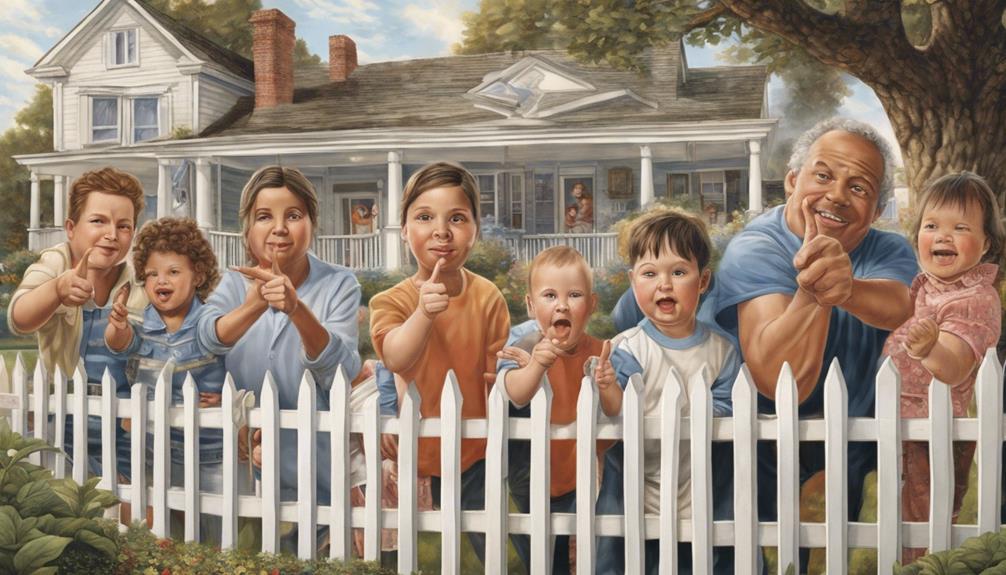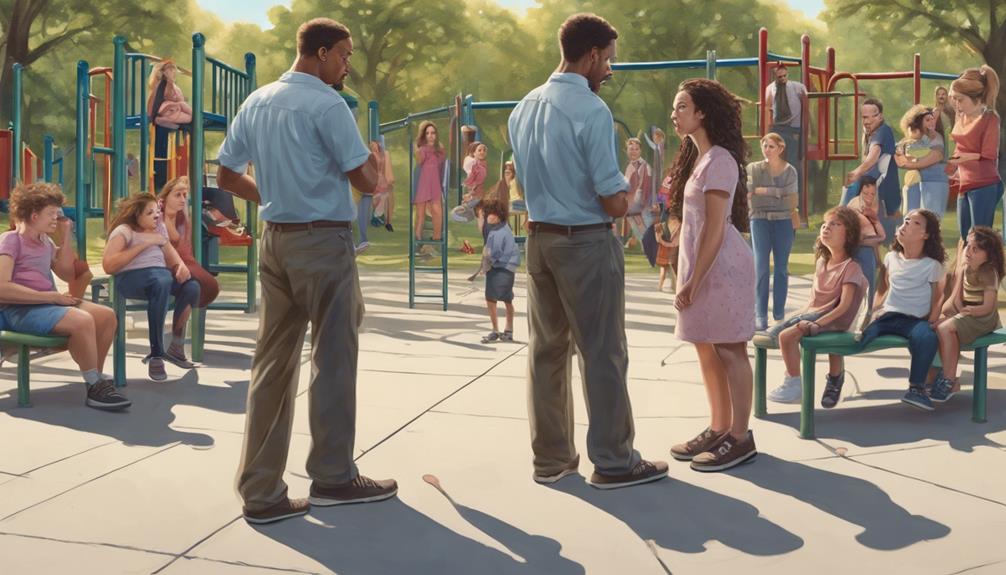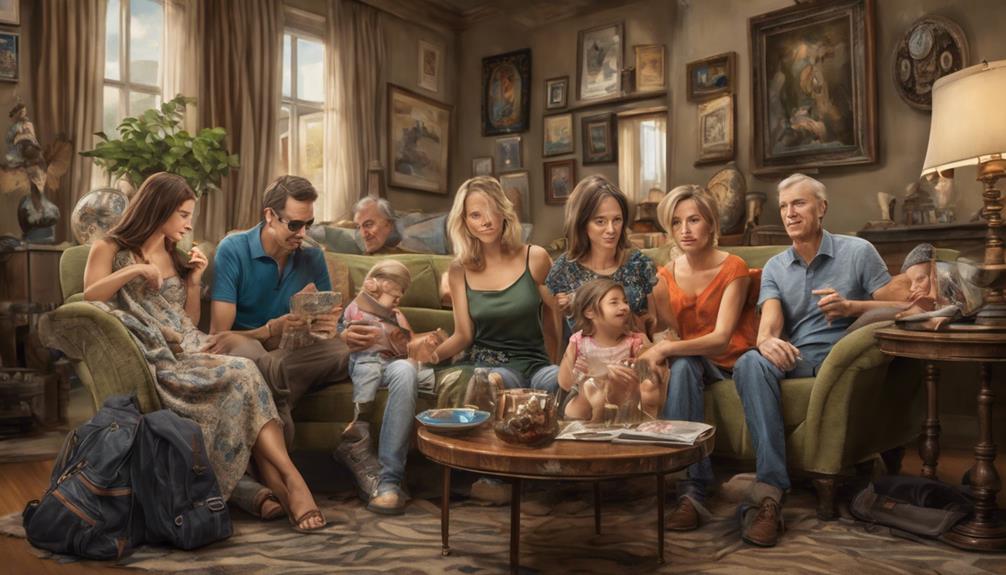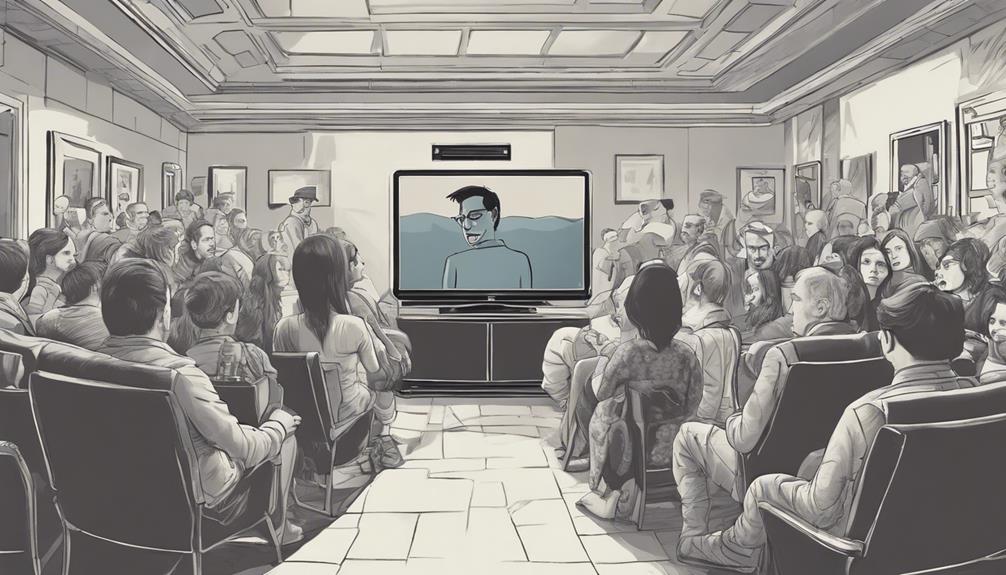Imagine attending a family gathering where a relative questions your decision not to have children, implying that your life lacks purpose without offspring.
The scrutiny and disapproval faced by childfree individuals often stem from deep-rooted societal beliefs and expectations. But what drives this persistent disapproval towards those who opt out of parenthood?
Let's explore the underlying reasons why some people harbor negative sentiments towards individuals who choose a childfree lifestyle.
Key Takeaways
- Misconceptions fuel judgments about childfree individuals.
- Social norms perpetuate stigma and unfair stereotypes.
- Lack of empathy leads to societal disapproval.
- Fear of challenging traditional roles creates discomfort.
Societal Expectations and Childfree Choices
Facing societal pressures and expectations that prioritize parenthood, childfree individuals often encounter judgment and scrutiny for their decision to deviate from the traditional path of marriage and children. Society's emphasis on parenthood as the ultimate goal can make those who choose not to have children feel like outsiders. The pressure to conform to societal expectations weighs heavily on individuals who are childfree, leading to feelings of inadequacy and alienation.
Societal expectations play a significant role in shaping attitudes towards childfree choices. The cultural narrative that equates fulfillment with parenthood can overshadow the validity of alternative lifestyles. Laws and policies that favor families further perpetuate the notion that having children isn't just a personal choice but a societal obligation. This pressure to conform can create a sense of shame and isolation for those who don't fit the mold.
In navigating these societal expectations, childfree individuals often find themselves defending their choices and asserting their right to live authentically, free from external judgment.
Misconceptions About Childfree Lifestyles

Many people mistakenly believe that choosing a childfree lifestyle automatically equates to selfishness or a lack of fulfillment. These misconceptions can lead to unfair judgments and stigmatization of those who don't have children.
It's crucial to challenge these stereotypes and promote understanding of the diverse reasons individuals may choose to be childfree.
Common Misconceptions
Childfree individuals often face misconceptions that label them as selfish and lacking in fulfillment or happiness without children. These misconceptions stem from a narrow view of what it means to lead a fulfilling life.
In reality, many childfree individuals find profound joy and purpose in various aspects of their lives beyond parenthood. Contrary to the belief that they're selfish, many childfree individuals are deeply caring and contribute meaningfully to their communities and relationships.
It's important to recognize that choosing not to have children is a valid lifestyle decision that can be made for a multitude of personal reasons. By dispelling these misconceptions, we can foster a more inclusive and understanding society.
Social Stigma
Despite the diverse reasons for opting not to have children, society often unfairly perceives individuals who choose a childfree lifestyle as selfish or self-centered. These misconceptions can lead to judgment, discrimination, and pressure to conform to traditional family norms. Some common misconceptions about childfree individuals include assumptions of loneliness, lack of fulfillment, and a perceived lack of contribution to society. This societal stigma against those who are childfree can result in scrutiny and criticism for deviating from expected paths of marriage and parenthood. Many of these misunderstandings stem from societal norms that prioritize parenting as the sole path to fulfillment and purpose.
| Misconceptions | Impact | Origin |
|---|---|---|
| Loneliness | Judgment | Societal norms |
| Lack of fulfillment | Discrimination | Traditional expectations |
| Lack of contribution | Pressure to conform | Misunderstandings |
Cultural Norms and Childfree Stigma
Cultural expectations often dictate that individuals should prioritize marriage and parenthood, contributing to the stigma against those who choose to remain childfree. In many societies, the pressure to conform to traditional family structures can be overwhelming, leading to misconceptions and negative attitudes towards childfree individuals.
- Social Norms: Society often views marriage and parenthood as essential milestones in life, marginalizing those who opt out.
- Stereotypes: Childfree individuals may be unfairly stereotyped as selfish or irresponsible for not having children.
- Judgment: People often face judgment and criticism for their decision to deviate from societal expectations of family life.
- Pressure to Conform: The social pressure to conform to traditional roles can alienate those who choose a different path.
- Deep-rooted Beliefs: Stigma against childfree individuals reflects ingrained beliefs about the importance of marriage and parenting in defining one's worth.
These factors intertwine to create a culture where choosing to remain childfree can be met with skepticism and disapproval.
Fear of Deviating From Traditional Roles

When societal expectations clash with individual choices, fear of straying from traditional roles can breed discomfort and disapproval towards those opting out of parenthood. In many cultures, predefined gender roles dictate that women should primarily be caregivers and mothers. When individuals, especially women, choose not to conform to these traditional roles by deciding not to have children, it can unsettle those who uphold these beliefs. Here's a table highlighting how fear of deviating from traditional roles affects perceptions of childfree individuals:
| Traditional Roles | Impact on Views of Childfree Individuals |
|---|---|
| Expectations of women as caregivers and mothers | Negative attitudes towards those without children |
| Cultural beliefs about family structures | Discomfort with those who challenge these norms |
| Linking fulfillment to parenthood | Disapproval of individuals opting out of parenthood |
These entrenched beliefs can create a sense of unease and disapproval towards individuals who choose to deviate from traditional gender roles by remaining childfree.
Pressure to Conform to Parenting Ideals

Society's pressure to conform to traditional parenting ideals often leads to stigma against individuals who choose not to have children. This pressure can be suffocating, making those who opt out of parenthood feel like they aren't meeting society's expectations.
- Social Norms: Society often expects everyone to follow a set path that includes marriage and children, leading to ostracism of those who deviate.
- Judgment: People who don't conform to traditional parenting norms may face criticism and disapproval from family, friends, and even strangers.
- Inadequacy: The pressure to conform can create feelings of inadequacy in childfree individuals who feel like they aren't fulfilling their societal role.
- Isolation: Non-conformity to parenting ideals can lead to exclusion and a sense of being different, which can be emotionally challenging.
- Stress: The constant pressure to conform to parenting standards can cause stress and anxiety for those who choose a childfree lifestyle.
Judgment and Criticism Towards Childfree Individuals

Feeling the weight of societal expectations, childfree individuals often find themselves under scrutiny and criticism for their choice to not have children. The judgment towards childfree individuals can stem from deep-rooted beliefs about traditional family structures and the role of parenthood in society. Stereotypes and misconceptions about childfree individuals perpetuate the negative attitudes they face, portraying them as selfish, irresponsible, or unfulfilled. This criticism highlights the societal pressure to conform to norms that prioritize parenthood, often overlooking the diverse reasons why individuals may choose to be childfree.
| Judgments Towards Childfree Individuals | Examples |
|---|---|
| Selfish | "You only care about yourself." |
| Irresponsible | "You're not mature enough to handle kids." |
| Lack of fulfillment | "You'll never experience true happiness without children." |
Lack of Understanding and Empathy

We see an empathy gap in society when it comes to understanding childfree individuals. Misconceptions about them being selfish or incomplete often cloud people's judgment.
Cultural norms strongly influence society's perception of those who choose not to have children.
Empathy Gap in Society
Despite societal advancements in acceptance and understanding, an empathy gap persists towards childfree individuals, leading to judgment and stigma. This gap in empathy can have significant impacts on the well-being and social experiences of those who choose not to have children.
Here are some key points to consider:
- Childfree choices are often misunderstood and stigmatized.
- Lack of understanding can result in judgment, criticism, and social exclusion.
- Society's pressure to conform to traditional family expectations disregards personal choices.
- Intrusive questioning, unsolicited advice, and negative stereotypes are common for childfree individuals.
- Increased awareness, acceptance, and respect for diverse life paths are necessary to bridge this empathy gap.
Misconceptions About Childfree
Misconceptions about childfree individuals often arise from a lack of empathy and understanding towards their decision. Society's failure to delve into the personal reasons behind choosing a childfree lifestyle leads to stereotypes and judgments that oversimplify the complexities of this choice.
Such misconceptions disregard the diverse motivations and values that inform individuals' decision to be childfree. When empathy is lacking, it can invalidate the feelings and experiences of childfree individuals, creating a sense of exclusion and misunderstanding.
To combat these misconceptions, a shift in perspective is necessary, one that embraces acceptance and respect for the varied paths people choose in life. Understanding the nuances of being childfree requires openness to diverse experiences and a willingness to learn from others' perspectives.
Cultural Norms Influence
Cultural norms influence the lack of understanding and empathy towards childfree individuals by perpetuating the belief that parenthood is essential for fulfillment and societal contribution. This ingrained perspective can lead to misconceptions and biases against those who choose alternative lifestyles. To delve deeper into this issue, consider the following:
- Traditional family structures as societal expectations
- Judgment and ostracization of childfree individuals
- Marginalization stemming from overlooking alternative lifestyles
- Societal pressure linking worth to parenthood
- Misconceptions fueled by the emphasis on procreation
These factors underscore how cultural norms shape perceptions and interactions with childfree individuals, highlighting the need for greater empathy and acceptance of diverse life choices.
Envy or Insecurity Towards Childfree Individuals

Envy and insecurity towards childfree individuals often stem from feelings of inadequacy and comparison to their freedom and lifestyle choices. It's natural to look at others' lives and wonder if we made the right decisions. Seeing childfree individuals enjoying their freedom can trigger a sense of longing for that kind of liberty. This envy mightn't be about not wanting children but about wanting the same level of independence and flexibility in our own lives.
Sometimes, feelings of insecurity about our own choices can lead to negative attitudes towards those who've taken a different path. It's easy to fall into the trap of comparing ourselves to childfree individuals and feeling like we come up short. These comparisons can unearth deep-seated insecurities about our own fulfillment and happiness.
When we feel envious or insecure about childfree individuals, it's essential to reflect on where these emotions are originating. By understanding the root cause of our feelings, we can work towards resolving our own insecurities rather than projecting them onto others.
Impact of Media Portrayals on Perceptions

When examining the impact of media portrayals on perceptions of childfree individuals, it becomes evident that traditional family structures often influence negative biases. Media portrayals tend to shape how society views those without children, often perpetuating stereotypes and misconceptions. Here are some key points to consider:
- Media often reinforces traditional family norms, portraying childfree individuals as deviating from societal expectations.
- Childfree individuals are frequently depicted as selfish, irresponsible, or unfulfilled compared to parents, leading to stigmatization.
- Stereotypes in media suggest that those without children lead less meaningful or happy lives, promoting misunderstanding.
- Diverse reasons for choosing not to have children are overlooked in media representations, contributing to the perpetuation of stigma.
- Limited positive portrayals of childfree individuals in media result in a lack of understanding and acceptance of their lifestyle choices.
These portrayals in media significantly impact how childfree individuals are perceived in society, highlighting the importance of promoting more accurate and inclusive representations.
Frequently Asked Questions
What Are the Psychological Effects of Childlessness?
The psychological effects of childlessness can include feelings of shame, guilt, and questioning one's worth and identity. These emotions can impact our overall well-being and lead to societal judgment and stigma.
Despite the challenges of parenting, childfree individuals often face misconceptions about their life satisfaction. It's crucial to understand and accept diverse life choices to create a more supportive environment for everyone.
Why Do Some Men Not Want Kids?
We choose not to have kids for various reasons such as personal preferences, career goals, or lifestyle choices. As societal norms shift, more men embrace a childfree life to prioritize personal growth and independence.
Financial concerns, commitment fears, and a desire for self-fulfillment also play a role. Despite these valid reasons, societal pressure and judgment towards men without kids persist, highlighting the need for greater acceptance of diverse family choices.
How Many People Regret Not Having Kids?
We found that around 20% of women and 12% of men aged 20-50 express regret about not having kids. This feeling is more common among women, influenced by societal expectations and personal desires.
Factors like evolving perspectives on parenthood and changing life circumstances can contribute to this regret.
It's essential to recognize the complexity of this issue and understand the various reasons individuals may feel this way.
Why Do Some People Prefer Not to Have Children?
We choose not to have children for various reasons. Some value career growth, others prioritize personal freedom. Financial concerns and health considerations also play a role. Our decision centers on independence and the pursuit of fulfilling lives without parenthood.
Society's shift towards individual happiness and self-expression has made this choice more acceptable. It's about focusing on personal development, relationships, and other fulfilling endeavors that bring us joy and purpose.
Conclusion
In conclusion, it's important to recognize the challenges childfree individuals face in a society that often prioritizes parenthood. According to a recent survey, 1 in 5 childfree individuals report feeling judged or stigmatized for their decision.
By understanding and respecting different choices regarding family planning, we can create a more inclusive and supportive environment for all individuals, regardless of their decision to have children or not.









